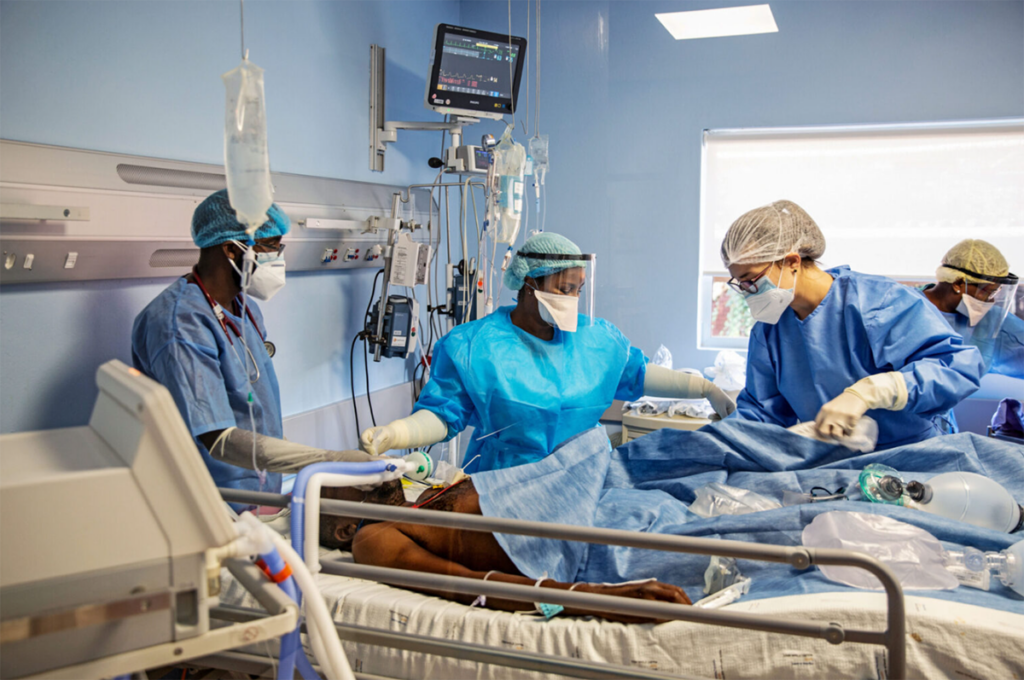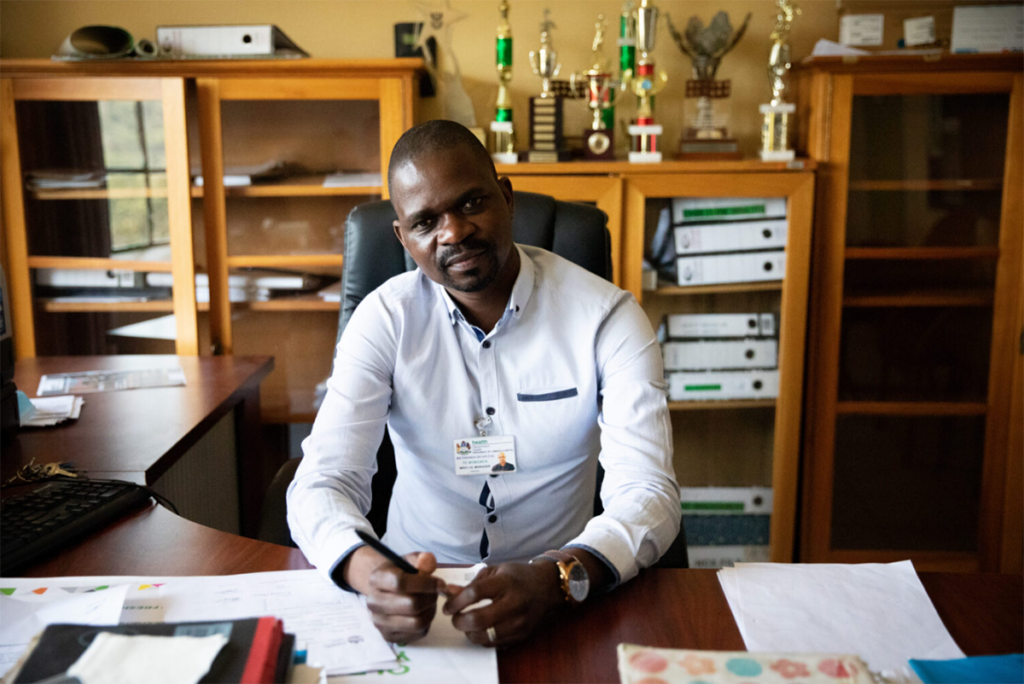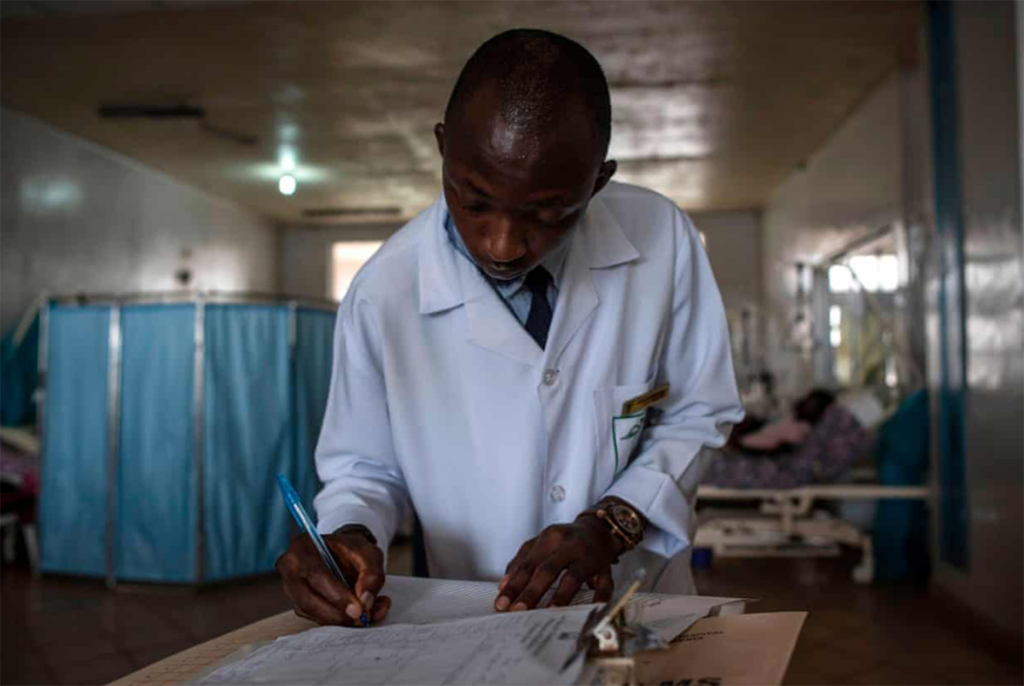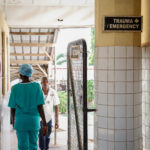- Recent cuts to South Africa’s provincial budgets are making less money available to pay for health science graduates who need to do their community service. These positions are often crucial to the healthcare needs of poor and underserved communities.
- Graduates from the medicine, dental and rehabilitation therapy fields need to do community service in order to be fully qualified, but nearly 200 of them have not been placed by 12 December.
- The national health department says they are working with the provincial governments to have more positions created for graduates who don’t have a spot yet for the January 2024 intake. In the meantime, medical graduates are stuck in limbo.
In today’s newsletter Nicole Ludolph and Zano Kunene explain how treasury’s budget cuts will impact health students waiting to be placed for community service. Sign up.

In 2022, the national treasury said it will make an extra R1.1-billion available for medical internships and community service positions this year. But now, because of the national purse asking provincial government departments — like health — to tighten their spending, there might be even less money available to pay for these positions.
A committee of deans representing health sciences faculties from universities across South Africa are worried about how having fewer community service posts filled will affect the quality of care for patients, especially in rural areas — the exact communities the in-service training programme was supposed to help.
But more so, Lionel Green-Thompson, dean of health sciences at the University of Cape Town and chair of the South African Committee of Medical Deans, told Bhekisisa, they’re concerned about posts not getting filled being a regular occurrence.
This plays off against a background of rural hospitals and clinics already being chronically understaffed.
According to a 2018 review by the Health Systems Trust “provinces struggle to find sufficient funding to employ all new health profession graduates in CS [community service] posts”. For example, when the Rural Health Advocacy Project looked at these positions in North West and the Eastern Cape, they found that posts in urban facilities were filled but those in rural hospitals remained vacant.
The treasury has cautioned previously that if the health department cannot make do with their allocations, “it will have to finance any future shortfalls within its baseline [read: reprioritise money within the health budget]”.
Although all medical interns have been placed for 2024, by December 12, 182 new radiographers, physiotherapists, dietitians, dentists and environmental health practitioners still had no position. Without placements, they won’t be allowed to practise in their fields, as they won’t be considered fully qualified.
Foster Mohale, spokesperson for the health department, says there are fewer positions because budget cuts from the treasury have forced provinces to limit the spending of money that comes from their cost of employment budget, which pays for medical internship and community service posts.
Since 1998, newly graduated health workers like dentists, doctors and pharmacists have been required to work at public hospitals or clinics for one or two years, depending on their field, before they’re deemed fully qualified. (Doctors have to do two years of internship, while other formal health workers, including dentists and physiotherapists, need to complete one year of community service.)
The policy was introduced to make sure that people who use state health facilities, especially those in rural areas, will also have access to specialist and rehabilitation care.
Money and worries
Provinces get money from the national government’s purse, called provincial equitable shares, to run their districts. In this allocation, the amount that can be spent on employees’ salaries is capped and is called the cost of employment budget.
To help fund community service posts and clinical training for graduates, provinces also receive a conditional grant called the human resources and training grant (HRTG), which is separate from the cost of employment budget.
Conditional grants are money given to provinces to provide specific services that are not included in the initial funds they receive from the treasury, and can’t be used for any other purpose.
With the HRTG expected to reduce from around R5.48-billion to R5.3-billion at the end of 2024, deans from health sciences faculties around the country are worried that funding woes will compromise the quality of healthcare services even more.
Figures from the World Health Organisation show that there’s only about one dentist for every 10 000 people in the country, with about a quarter working in government hospitals or clinics. According to the South African Society of Physiotherapy, there’s only one physiotherapist for almost 7 000 South Africans. By April 2020, over 8 000 physiotherapists were registered in the country, but only around 1 500 worked in the public sector.
Research shows that, ideally, the country needs an extra 2 267 dentists by 2030 if every South African were to have access to oral healthcare. To meet the physiotherapist needs, there would need to be three to four physiotherapists for every 10 000 people who use government hospitals and clinics.
The decline in community service placements for clinical workers other than doctors, says Green-Thompson, could leave underserved parts of South Africa without access to healthcare that falls outside the scope of what a doctor offers.
“We already have poor provision of [these types of] services across our system and community service appointments are often the only care that our people get.”
A place for everyone — or not
Amy Jones,* 23, is a case in point. She will graduate as a dentist this month. Yet she won’t be able to practise — because she doesn’t have a spot at a state hospital to do her community service next year, essentially extending her training and denying patients her care.
Jones, along with 10 385 other final-year health science students, applied with the national health department to do their 2024 community service. Although her classmates received SMSs in November to say that they have been placed at hospitals and clinics around the country, she got nothing.
Despite the country struggling to place graduates like Jones, there are already too few such staff in public hospitals.
Towards the end of their final year, all health sciences students need to submit five choices, across three provinces and including rural areas, for a facility where they’d like to do their community service or internship. The health department looks at what type of clinical staff these facilities need as well as how much money is available to fund their posts.
The department then allocates students to a hospital or clinic, followed by an offer letter from that facility’s provincial health department to confirm their position and that they’re expected from January 2024.
Announcements about allocations started going out on 23 November, but like Jones, some students didn’t get any news.
Graduates doing their internships and community service are paid by provinces through the HRTG.
In the Western Cape, expected budget cuts to the HRTG will impact the placement of more than 50 students in community service posts — including medical officer and pharmacist positions — for 2024’s mid-year placements, says Dwayne Evans, assistant director of communications for the Western Cape health department. (Students who were not placed or didn’t meet the requirements for the January intake can apply to be placed in a second round in July.)
The treasury’s cuts will also impact the training of South Africa’s future doctors, as a 10% cut for 2024 will leave more than 87 000 university students across disciplines without funding for their fees, the National Student Financial Aid Scheme (NSFAS) announced in a presentation last month.
The state-funded bursary scheme pays for students whose combined annual household income is below R350 000, and covers their university registration costs, tuition fees, study material and accommodation, as well as giving them a monthly allowance to use on food and transport to university.
Funding challenges at NSFAS have often left students, including those from health sciences, without their food and living allowances, says the committee of deans in a statement, which could make it harder for them to focus on their studies.
At home or in the hospital?
The committee of deans is concerned that budget cuts will affect the quality of training for health sciences students — which will have a knock-on effect on service delivery in state facilities. Already, community service placements are determined more by the needs of the facility, with less of a focus on training and improving the skills of newly graduated healthcare workers.
Rural facilities in particular don’t have many permanent healthcare workers, as it’s difficult to attract them to these hospitals, and often rely on the work provided by new graduates doing their community service — at the expense of patients’ needs in underserved communities.
Dental diseases, for instance, are common in South Africa. Over 40% of children under the age of nine suffer from untreated cavities in their baby teeth. In young children, untreated cavities are painful and can cause infections that make it harder for them to eat, speak and learn, especially as children who don’t get the needed dental care miss school more often and get lower grades than children who don’t.
Although universities have answered the government’s calls to increase the number of graduates in health sciences, provinces are struggling to match the supply with available posts, says Green-Thompson.
“We have called [in the past] for a clearer management of the required financial resources and the emerging numbers of graduates,” he says.
Another worry is that having no posts for graduates goes against the country’s Human Resources for Health Strategy, which is the government’s commitment to investing in the country’s health workforce to prepare for the National Health Insurance fund.
Green-Thompson adds that having graduates sitting at home while they could have been deployed to areas in need will leave many patients without access to professionals like speech pathologists and occupational therapists in the public sector.
Protecting the health sector from budget cuts
Mohale says the health department is working with provinces to get them to create more positions by 31 December for the 182 students without a post.
Health sciences graduates need to register with the Health Professions Council of South Africa (HPCSA) before they can begin their community service. Christopher Tsatsawane, head of corporate affairs at the council says they receive these applications directly from universities.
To prevent funding issues from blocking graduates from registering, universities are working with students whose fees for the 2023 academic year have not been fully paid by the state bursar through acknowledgement of debt agreements, says Green-Thompson.
According to these agreements, students will start paying their own fees next year via debit order unless NSFAS pays their balances first. The university then sends students’ names to the HPCSA, confirming that they have completed their qualifications.
“The HPCSA can only register those confirmed eligible and will not necessarily know of graduates that may have been [financially] excluded,” says Tsatsawane.
The committee of deans are recommending that the health department finalise discussions with the treasury ‘“to protect the health sector from budget cuts”.
*Not her real name












